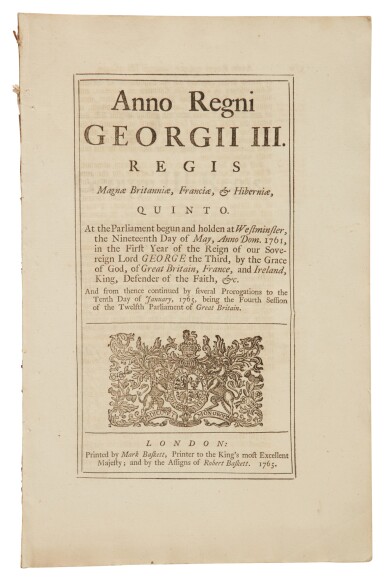Parliamentary Act. Reign of George IIIAn Act to discontinue, in such Manner, and for such Time as are therein mentioned, the landing and discharging, lading or shipping, of Goods, Wares, and Merchandise at the Town, and within the Harbour, of Boston, in the Province of Massachuset’s Bay, in North America. London: Printed by Charles Eyre and William Strahan, 1774 Folio (311 x 191 mm). Woodcut arms of Great Britain, woodcut headpiece and initial, text in black letter, side notes in roman type. Modern quarter calf over brown marbled boards, printed paper label on front cover. The Boston Port Bill, the first of the four "Intolerable Acts," which was passed by Parliament 31 March 1774 and took effect on 1 June. The other three, otherwise known as the Coercive Acts, were a new Quartering Act, the Administration of Justice Act, and the Massachusetts Government Act. The Boston Port Bill closed Boston Harbor until the town provided restitution to the Crown's treasury and to the East India Company for damages caused by, and for revenues lost (nearly $1 million in today's money) due to, "dangerous Commotions and Insurrections [which] have been fomented and raised in the Town of Boston … to the Subversion of His Majesty's Government, and to the utter Destruction of the publick Peace, and good Order of said Town." The Boston Tea Parry is cited by the Act as one of the "dangerous Commotions." As part of the Crown’s attempt to intimidate Boston’s increasingly unruly townspeople, King George III appointed General Thomas Gage who commanded the British army in North America, as the new governor of Massachusetts. Gage assumed that office in May 1774, before the Massachusetts Government Act revoked the colony’s 1691 charter and curtailed the powers of the traditional town meeting and colonial council. These moves made it clear to Bostonians that the Crown intended to impose martial law. Gage landed in Boston with his troops on 13 May; by June he had neatly sealed the ports of Boston and Charlestown using the formidable British navy. Parliament had hoped that the Coercive Acts would isolate Boston from the rest of North America, but rather than abandon Boston, the colonies sent much needed supplies to the city and formed provincial congresses to marshall resistance to the Crown. REFERENCE:Church V:1102; ESTC N57444Condition reportCondition as described in catalogue entry. The lot is sold in the condition it is in at the time of sale. The
Parliamentary Act. Reign of George IIIAn Act to discontinue, in such Manner, and for such Time as are therein mentioned, the landing and discharging, lading or shipping, of Goods, Wares, and Merchandise at the Town, and within the Harbour, of Boston, in the Province of Massachuset’s Bay, in North America. London: Printed by Charles Eyre and William Strahan, 1774 Folio (311 x 191 mm). Woodcut arms of Great Britain, woodcut headpiece and initial, text in black letter, side notes in roman type. Modern quarter calf over brown marbled boards, printed paper label on front cover. The Boston Port Bill, the first of the four "Intolerable Acts," which was passed by Parliament 31 March 1774 and took effect on 1 June. The other three, otherwise known as the Coercive Acts, were a new Quartering Act, the Administration of Justice Act, and the Massachusetts Government Act. The Boston Port Bill closed Boston Harbor until the town provided restitution to the Crown's treasury and to the East India Company for damages caused by, and for revenues lost (nearly $1 million in today's money) due to, "dangerous Commotions and Insurrections [which] have been fomented and raised in the Town of Boston … to the Subversion of His Majesty's Government, and to the utter Destruction of the publick Peace, and good Order of said Town." The Boston Tea Parry is cited by the Act as one of the "dangerous Commotions." As part of the Crown’s attempt to intimidate Boston’s increasingly unruly townspeople, King George III appointed General Thomas Gage who commanded the British army in North America, as the new governor of Massachusetts. Gage assumed that office in May 1774, before the Massachusetts Government Act revoked the colony’s 1691 charter and curtailed the powers of the traditional town meeting and colonial council. These moves made it clear to Bostonians that the Crown intended to impose martial law. Gage landed in Boston with his troops on 13 May; by June he had neatly sealed the ports of Boston and Charlestown using the formidable British navy. Parliament had hoped that the Coercive Acts would isolate Boston from the rest of North America, but rather than abandon Boston, the colonies sent much needed supplies to the city and formed provincial congresses to marshall resistance to the Crown. REFERENCE:Church V:1102; ESTC N57444Condition reportCondition as described in catalogue entry. The lot is sold in the condition it is in at the time of sale. The















Testen Sie LotSearch und seine Premium-Features 7 Tage - ohne Kosten!
Lassen Sie sich automatisch über neue Objekte in kommenden Auktionen benachrichtigen.
Suchauftrag anlegen